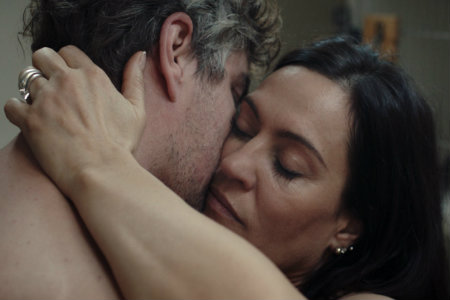Written and directed by Renée Beaulieu, Les Salopes or the Naturally Wanton Pleasure of Skin is primarily a film about desire. Marie-Claire (Brigitte Pouppart), professor of dermatology, is undertaking a new scientific research project on skin cells and how they are affected by sexuality. As she embarks on this project, a chain of events disrupts her career, family and above all, her intimate life.

When speaking to Beaulieu about the film, we began about how the idea for the film come about. “I want to exactly to reverse cinema’s stereotypes about women… not the reverse exactly but [bring it closer to] the truth. Women seldom get leading roles. They are [most often] the object of desire in films. So I built my story around a central female character: a mother who is mature, intelligent, scholarly, independent financially and intellectually and attractive, who has sexual desires and enjoys sexuality for her own pleasure, not only for that of her partners.”
Marie-Claire is happily married wife and mother of two teenage kids. She is confident and goes after who and what she wants. No regrets.
Her research on touch and sexuality allows her to get a few pleasures of her own. Soon enough, she must confront the consequences her choices have on her family and career when a scandal threatens to shed light on her ‘extracurricular affairs’, in this drama about the nature, limits, and consequences of desire.
The film touches upon some ‘complicated’ relationships between professors and students. One involves Marie-Claire with a male student, Émile (Pierre Kwenders). Another one a male professor with a female student, Sofia (Charlotte Aubin). When the male professor is forced to leave the university for his ‘inappropriate’ behaviour, Marie-Claire questions whether she’ll be found out as well. Sofia talks to Marie-Claire about what transpired.
Depending on how you interpret Marie-Claire’s reaction towards the female student for what happened, this can be seen as a bit controversial. When addressing this part of the film, Beaulieu admits “I know I touched a delicate point… I wanted to talk about victimization and access of pleasure for women…” Beaulieu wanted to present two possible “hypotheses” on how to interpret the situation.
Personally, I did not think Marie-Claire’s reaction towards Sofia was completely unfair. Although it can certainly come across that way. I do like seeing women who speak their mind.

One other aspect of the film I found interesting is the idea of an open marriage. In the film, we see a double-standard when Marie-Claire pursuits this option. Her husband Adam (Vincent Leclerc) chooses not to, and is upset when he finds out Marie-Clare has been seeing other men. I appreciate this part of the plot because we do not see this type of topic addressed openly. The idea of an open marriage is often seen as taboo, yet it might be more common than we think. Beaulieu agreed, she wanted to highlight this double-standard as well.
The film begins and ends with explicit sexual scenes. I enjoyed the first few minutes of the film which include a very erotic scene. This particular scene would not have looked out of place during a film that you might find on an adult website such as https://www.porn-hd.xxx/. It sets the tone for the film and presents Marie-Claire in a very confident way. I think the scene helps the audience feel comfortable with Marie-Claire’s sexuality.
In the script this is the first scene as well, shared Beaulieu. “It’s important for me to show a woman who is comfortable with her sexuality.” Setting the tone from the beginning, we are informed of the kind of story we are about to witness. The explicit and overt sexual scenes are refreshing when it comes to films by, about, and for women. It is important to include female characters that show confidence, overt sexuality and desire onscreen.
Pouppart as Marie-Claire is a great choice of casting. Beaulieu explained how the two of them “talked about the character. We are of the same mind of how we understood the script… [Marie-Claire] is a confident, emancipated woman who is interested in sexuality.”
At the end of the film, there is a beautiful scene outside in the winter. It brings the story back together… Marie-Claire looks at the camera, as if to defiantly remind us of her confidence in herself and her sexuality.







